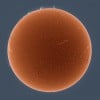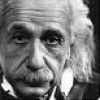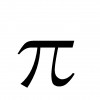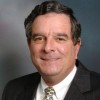Mathematics Is "Absolute"
Because the thread which inspired me was dead...
I have made the claim and am quite happy to engage in discussion with anyone who feels that they can and should disagree. As a mathematician with years of experience explaining math to people, I feel that I should be able to allay any doubt as to the veracity of the statement. Now, for some elaboration:
I read a thread which proposed math to be contradictory by way of Zeno's Paradox. The discussion went on.. and on.. and on as many people with little training in mathematics made good efforts to consider the topic. Finally, someone pointed out that calculus had solved the paradox, making it no longer truly paradoxical. Mathematics is absolute in every way that I can think of; it is never truly contradictory and there is no subjectivity to what is correct or incorrect. I understand that not everybody believes this, but I truly think that the reason for that is because not everybody has had their doubts sufficiently put to rest.Simple answer is yes otherwise it would not be useful for anything......
Mathematics is all about the logics of working out the interaction of the positives and the negative .. to degree if complexity determines the degree of difficulty.
But since the eventuality of all the interactions of the negatives among itself is positive....
Then you will eventually see that it all amounts logical simplicity of 1+1=2 ...is that absolute , if so then mathematics is Absolute.how can math be obsolete? for example, the field of engineering. without out it we couldnt build roads and bridges. drive a car. build a dam that would hold back flood waters and save thousands of homes and people. how can we do all of this without math? math is what the myans used to create info. its been around since the start of time and will continue to be something every needs.
Oh. Thank you "spooky" fox. Now I am just unsure if it was deliberate and satirical or unintentional and careless...
An x files reference with the name, by the way?Well, I figured you were either an X Files aficionado or perhaps a goth chick. And, I just narrowed it down by the subject matter on which you were commenting. Easy peasy.
Respected Sir
With all due respect to your sentiments and stature... for I am greatly honored whenever I have the opportunity to talk to a teacher ... I seek your permission to state ...
That Mathematics, in my opinion ... is an Absolutely Limited Discipline for Understanding, or Defining The Truth of Existential Reality, which Is Composed of the Physical ... Existent, In the Ideal State of ... of The Created Form.
Thus, Mathematics is a "Physicals Limited Exactitude" which should not be confused with Truth, or, as the correct Method of Cognitions, which can Define the Existential's Reality.
For sooner than is realized by its votaries, Mathematics has to Rely on Symbolism ... and seek the Crutches of Insane Philosophy, and the contra-senses ... Theories ... to make the "Whole" point.
This goes for Theoretical, Pure and Applied, etc., Mathematics.
In medieval times, when Arabs were indulging for the first time in serious mathematics ... they gave it the Arabic name of "Riazi" which, in Arabic means "Sports"
I think, its better if we keep it that way ... so that the souls, of Khayyam, Al Beiruni, and Sina etc., can continue to rest in peace ... lets not conjure up another new god, out of Mathematical Absolutism ... for it is a Discipline, addressing the Limited "Physical" aspects of Form, with Infinities ...
In simple words ... Mathematics is Logic's numerical application ... and it does help us understand, the Rudimentary Quantums of Form ... But any Rudimentary Understanding of the Existential Reality, is never considerable, The Truth of Existential's Realty !I appreciate the very well-formulated response Shahid, and I would like to say that your position is certainly quite sensible. I'm not sure that even I would be so brash as to say that mathematics is absolute TRUTH, the ultimate knowledge of the universe, or anything like that. My position was really intended to run counter to the belief that mathematics is somehow inherently inconsistent or unreliable, since I noticed a fair amount of traffic dedicated to arguing just that idea.
You said it correctly when you said "Mathematics is Logic's numerical application," but it certainly isn't well-suited to understanding Existential Reality, as I understand it to be. So, I agree with you; but I maintain my position as I intended it - that mathematics is a coherent, consistent whole and that it is a logical body of knowledge in every way (Logic is usually considered a sub-discipline in mathematics!).
I apologize for any confusion that my word choice may have caused.Respected Sir
It is my "absolute" pleasure to have received your kind response ... Thank you very much indeed.
Kindly treat me as one of your pupils ... and, as such, allow me to say, that teachers have the licence, to be carried away, once in a while, and I loved your being carried away ...
Please rest assured, I was not confused by the fact of Logic being treated as a sub-discipline of mathematics ...
Kind regards
,Shahid, I did not mean to take so long in response - my apologies.
Thank you for the kind feedback; though I don't think that I am really qualified to have "pupils," as such. However, if you ever have any questions or even just comments about mathematics, I'd be delighted to hear from you again in the future. Of course, I'd be delighted to hear even if it isn't about mathematics, but I cannot say for certain that I would have anything relevant to add. Best wishes for you, sir. I look forward to future discussions.Respected Sir
Its OK ... teachers have this licence too ... you are always welcome, anytime.
Regards
I agree with mathsciguy. In The Hitchhikers Guide to the Galaxy, by the late Douglas Adams, a supercomputer named Deep Thought was asked: What's the answer to the question of Life, the universe, and everything? The computer's reply: 42. That sounds like an absolute to me!
Douglas Adams died??? When did that happen?
I miss those books...
I typically refrain from such philosophical endeavors as the question of Life, the universe, and everything, but I think that the cohesion of mathematics as an epistemological truth is something I can defend. Thanks for your support, Larry.
Penrose:
"what underlies our ability to access mathematical truth?"
- In a chapter that explains the three mysteries, the relationship of the Platonic World, the Physical World and the Mental World.
So, what about the scenario where something cannot be divided beyond a certain point. IE, it becomes so infinitesimal that it cannot be measured or mathematically stated.
Or, conversely, something so incredibly lage that it cannot be quantified, therefore mathematically explained.
I am by no means trained, or expert, but am curious as to your answer! (please try and keep it simple "
"yep in mathematics it called Infinity...nevertheless you can relate to it as one... you Know ONE you know infinity...
I did say keep it simple.
Your reply is more complex than my question.
Bit circular also. I am all, all is one, all is me, kinda stuff.
I am still living on planet Earth.
three simple sentences, 19 simple everyday words...
Maybe I do not know what simple means.
Try this...Take one and multiply it indefinitely....it is still one yet infinite.
Take one a divide it infinitely it is still one yet infinite....
dont get caught up on infinite .. it is merely one.An interesting idea. I have to agree that the wording is a little confusing, though. And I'm not sure how rigorously the value 1 can be defined as actually being "infinite."
This is a good point, and one which really had stumped the mathematicians of antiquity. Numbers had been created to describe amounts of things seen in the real world - but, just how much can you describe with numbers??
Let's look real quickly at the case for incredibly large numbers first. The concept of infinity wasn't always around, so when it was proposed (waaayyyy back when) it had to be proven first. To do this, let's start with any number and call it X. Now, we can certainly agree that adding 1 to any number is legit and the result will always be a larger number, right? So, X +1 is always larger than X. Then, we can take (X +1) and add another 1 to that... and so on. Thus, even mind-bogglingly large quantities can always be described my mathematics. There is literally no end.
Now, as for infinitesimally small quantities, the proof runs the same except you will divide X by any number (except for 0 or 1!) and then divide the new result by the same number again and again and again and...
Well, you get the idea. Hope that clears it up a little bit at least!I do get that.
How can mathematics then be absolute, if we can keep pushing these two boundaries ever further?
What happens when there is no longer an intelligent mind that can "apply or examine" the rules/laws of mathematics? Is it still there? (absolute), or does it disappear along with the said intelligent mind(s)?
IE. If ALL humanity, and every other form of intelligent life suddenly died/ceased to exist?Ah, I see what you mean. Perhaps then I should refine my definition of "absolute." When I say that mathematics is absolute, I mean that there are no inconsistencies in the results thereof, and there is not really a subjective aspect to solutions. So, the idea of infinity does not disqualify mathematics from being 'absolute' as I mean it.
Maybe you are thinking of absolute as in 'unchanging' and seeing a growing boundary as a change in mathematics? This is reasonable, since most people contend that 1+1 =2 will never change, and therefore math is absolute. However, infinity does not change either. It will always represent the quality of going on and on and on forever. I hope that addressed the issue, or at least wasn't totally confusing.
Now, will mathematics exist without humanity? I say the answer is no if you mean 'mathematics' as in the study of relationships of numbers and quantities to the world and to each other. After all, there can't be any study without someone to do the studying! However, the rules and laws will still exist without intelligence to observe them - 1 and 1 will still make 2 even if no intelligence existed to notice it.
That's my two cents on the matter, anyhow. Let me know if that is unconvincing in any way, or if I need to clarify anything. And thanks for participating in the discussion; it edifies and strengthens the mind to engage in such careful thought and analysis.What does that have to do with anything? Who cares?
Do you have some point to that line of logic?
And yet, there is no "certain point" that something divided cannot be continuously divided to the infinite. Mathematics can handle that.
And yet, mathematics can explain something incredibly large. From where do you get those notions?
Well said, Beelzedad. I always find your responses on other forums to be interesting and informative. Thanks for contributing here.
All I can say Sir is that Math doesn't seem to like me.....

Well, you are in good company, miss. Math doesn't like anyone. Not even Einstein.

"Do not worry about your problems with mathematics, I assure you mine are far greater." - Albert Einstein
Thank you for writing this hub. I read the hub on Zeno's Paradox and I wanted to write on this same topic. Now I am glad that I didn't because you are clearly a much better writer than I am.
I do not disagree with anything you have asserted in this article; however, I think that it's also worth mentioning that mathematics is absolute because it is an artificial construct. Mathematics is an abstract system of thought that allows us to better understand and predict the world around us, not a physical science.
What I mean by this is that 1 + 1 = 2 because we define it to be so. Therefore, it can be no other way (by definition). I think where people become confused is when we apply mathematics to the physical world. For example, in statistics we have concepts like "sample standard deviation" and "approximately Normal curves", in Physics we have formulas based on "ideal" situations that can never actually occur in reality.
This makes it appear that mathematics is based, at least in part, on guesswork. However, this is because these examples are applications of mathematics - not pure mathematics. The guesswork involved in these examples stem from not having access to the all of the information ahead of time, not due to some failing of mathematics as a science.I cannot agree that we "defined" 1 + 1 = 2 and that is why it is so. While we have defined the numeral (written representation of the number) and the word (same thing) we did not define the actual numbers or equation. It is a property of mathematics that we "discovered" and assigned names and written squiggles to but did not define.
True enough wilderness. Though changing the wording to something like "1 + 1 = 2 by definition" would make it more acceptable, correct? This doesn't imply that humanity "invented" the rules of mathematics, but rather has discovered the relationships and named them, etc.
As I have said before (though I don't recall if it was in this topic or not), the rules of mathematics have always been true and will always be true, even if there is no more sentient life to appreciate and acknowledge them. I'm not sure if that adds anything relevant to your statement or not, but it seemed worth saying anyhow. At any rate, thanks for the input! You seem usually to have worthwhile things to say every time I see one of your forum posts.
Yes! And to think that you thought me a better writer...
Well said, sir or madam, this is an excellent point and one that I think is particularly relevant since it addresses WHY mathematics is absolute. I mentioned in a different hub a conversation that I had with my dad a few years back about the confusion sometimes caused by statistics. You hit the nail on the head, I think.
Thank you for your contribution and the quite insightful commentary.
So to the thought provoking phrase:"if a tree falls in the forest and noone around to hear it, does it make a sound"? - the answer is Yes??
Peter,
There's a variation on the forest conundrum:
If a man is talking in a forest, and there's no woman to hear him, does that mean that he's still wrong? :-)Yeah, I first heard this years ago and used it in many a cocktail conversation.
Related Discussions
- 7
G-d is infinite, eternal, absolute, boundless and abstract then, how can he be J
by Neferkaptah 13 years ago
G-d is infinite, eternal, absolute, boundless and abstract then, how can he be Jesus, the Christ?G-d is infinite in size and you cannot increase or decrease G-d, G-d is eternal always the same, G-d is absolute and boundless without limitations, parameters and G-d is unversally abstract, not known...
- 307
Evolution, True or False!
by Sheila Craan 11 years ago
Does the theory of evolution make sense to you?
- 36
What is necessary to prove whether or not absolute truth exists?
by Paula 11 years ago
What is necessary to prove whether or not absolute truth exists?This is a hotly contested topic of debate for many, and has been for centuries. Can you think of anything that would help shed light on this subject? Does absolute truth exist? Or if you prefer to answer this one,...
- 7
Is mathematics discovered or invented?
by ptosis 13 years ago
Is mathematics discovered or invented?
- 4
What are the many types of infinity in Mathematics?
by Sid Kemp 13 years ago
What are the many types of infinity in Mathematics?I have heard that, in mathematics, there are many types of infinity. I'm aware of some examples. But I'd like to collect more. Could people please share different types of mathematical infinity?
- 55
Has the Universe been around forever? No, therefore there is a God
by chasemillis 13 years ago
Matter cannot be created or destroyed. Ok that's easy.So that means that the Universe has been around forever. That would be great, except there are no real world examples of infinity. If infinity is not a quality of anything in the Universe, how can it be a quality of the Universe? It doesn't...


















